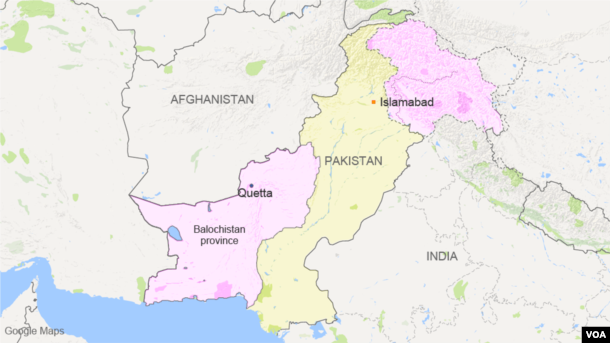Detection of a rare strain of polio in Pakistan’s southwestern Baluchistan province has alarmed authorities and prompted them to launch special immunization campaigns for children younger than 5.
After concluding a five-day response campaign across the provincial capital of Quetta earlier this month, health officials said they plan to give anti-polio drops starting January 16 to millions of children across 27 districts of the province, including those near the Afghan border.
The new, intensified immunization effort follows detection of the rare Type 2 strain of polio, which the World Health Organization found in sewage samples in one of the districts in the province.
Pakistan, Afghanistan and Nigeria are the only three countries in the world where the crippling virus is still active.
Remarkable progress
Despite security challenges and administrative weaknesses in national immunization efforts, Pakistan’s anti-polio fight achieved remarkable progress in 2015 when the country of about 200 million reported only 19 cases, down from a record of 309 cases in 2014.
Aftab Kakar of the provincial emergency operation center in Quetta says that Type 2 polio struck about 15 children three years ago in the Killa Abdullah district toward the Afghan border.
But routine immunization campaigns coupled with special response efforts at the time stopped the transmission of the virus until WHO’s findings released a couple of weeks ago confirmed its re-emergence in Baluchistan, where only one polio case was reported in 2016, Kakar said.
“The international community has shown its concern over the detection of this (Type 2) virus in Pakistan because the rest of the world has eliminated it and reported no new cases for years,” he noted.

Balochistan province, Pakistan
Type 2 virus
Pakistan stopped vaccinating children against the Type 2 polio during routine immunization campaigns since last April, believing the strain had been successfully eliminated from the country as in the rest of the world, Kakar said.
“Now, our major concern and fear is that the group of children who were born after April 2016 are not immunized against Type 2 poliovirus. That group is now vulnerable and is in danger of contracting the virus,” he warned.
On Wednesday, provincial health officials reported the first polio case of the new year in Killa Abdullah, but the strain of the virus was not known immediately.
Border campaign
Baluchistan shares a nearly 1,200-kilometer border with Afghanistan and as many as 20,000 people move across the main Chaman border crossing everyday, where special vaccinating teams are deployed to ensure children moving in both directions are given anti-polio drops.
Col. Changez Zeb, in charge of Pakistani border forces, explained the anti-polio operation to VOA during a visit to the busy crossing point.
“This is the sign of the polio vaccination,” he said while pointing to the inked fingers of three young Afghan children driven in an improvised cart by their parents after receiving the medicine. “The polio team has given them the vaccination while entering and while exiting from Pakistan. They have three to four teams here. If one of them misses (the children) the other one catches them.”
Pakistani authorities insist that successes against polio is the outcome of national immunization efforts coupled with recruiting hundreds of thousands of influential Muslim clerics to persuade parents in remote, relatively conservative districts who used to resist the vaccination drops for their children because of religious beliefs or suspicions it would hurt fertility.
The refusals and militant threats to vaccinating teams undermined anti-polio drives in recent years. But Kakar says that refusals have lately dropped from thousands to hundreds, while improved security in Baluchistan has also played a key role in conducting effective immunization campaigns.
Extremist groups view anti-polio campaigns as a cover for Western spies, prompting deadly attacks on vaccinators during immunization campaigns across Pakistan. A bomb explosion in January 2016 killed 15 people outside a vaccination center in Quetta. The anti-state Pakistani Taliban claimed responsibility for the bloodshed.
Opposition is also blamed on a fake CIA-sponsored immunization campaign that led to the famous May 2011 covert American military raid against fugitive al-Qaida leader Osama bin Laden in the Pakistani town of Abbottabad, killing the world’s most wanted man.

No comments:
Post a Comment